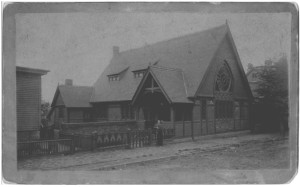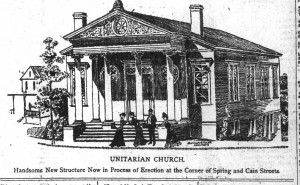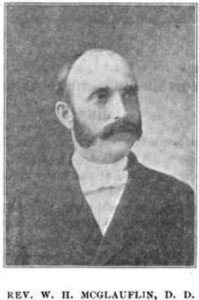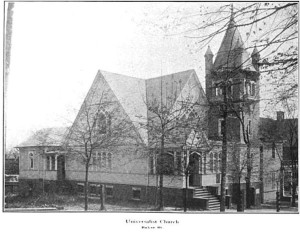Atlanta and Its Builders: A Comprehensive History of the Gate City of the South – 1902
UNITARIAN
First Unitarian Church of Atlanta (The Church of Our Father, Unitarian) was organized in the spring of 1883 in an upper room of the old Kimball

House by Rev. George Leonard Chaney and ten others. Mr. Chaney had held services during the spring and fall of the preceding year, in the Senate Chamber, the United States Court room, and Concordia Hall, and from the two or three families at first interested in this movement were added a sufficient number of interested persons to justify the organization of a local church, Soon after the formation of the church, the property at the corner of North Forsyth and Church streets was purchased and a suitable chapel was erected on the Church street end of the property. The chapel was built and occupied by the church on Christmas of the year of its organization, but the building was not formally dedicated until April 23. 1884. The architect of this building was Mr. G. L. Norrman and it was pronounced by so competent a judge as Bishop Beckwith “a perfect gem.”
Rev. George Leonard Chaney continued in the office of minister for eight years, and during the period of his residence in Atlanta was directly responsible for the organization of many good works not connected with the church, notably, the founding of the Georgia School of Technology. He resigned to become the superintendent of the American Unitarian Association for the Southern States.
He was succeeded in 1892 by Rev. W. R. Cole, who came directly from the Divinity School of Harvard University. After four years of efficient service Mr. Cole resigned to accept a call from the First Parish of Cohasset, Mass, Rev. W. R. Cole was followed by Rev. W. S. Vail, who came to Atlanta from Wichita, Kansas, but had previously been affiliated with the Universalists in Minneapolis. Dr. Vail spent four or five useful years in the community, resigning his charge in November of 1889 to accept a call from the Unitarian Church of Sioux City, Iowa.
The church was without a minister until April, 1900, when Rev. C. A. Langston, the present minister came from Boston to assume the pastorate of the Atlanta church, Mr. Langston upon graduation from the Divinity School of Harvard University entered city missionary work in Boston which, after four years of service, he resigned to accept the call from the Atlanta church.
A few months previous to his coming the church accepted an offer, the tender of the Board of Trustees of the Carnegie Library for the purchase

of the property, at the corner of North Forsyth and Church streets, With the proceeds of that sale a suitable lot was purchased at the present site of the church (corner of Spring and Cain streets), upon which the present church building was erected, The dedication exercises were held on November 11, 1900, and were participated in by Rev. Samuel A. Eliot. D. D., president of the American Unitarian Association, Boston and Rev. Marion F. Ham, Chattanooga, Tenn. On the following Monday evening Rev. C. A. Langston was installed as the permanent minister.
The new church has every convenience for the work of a modern parish and is held entirely free of debt.
During the sixteen years of Unitarian work in Atlanta many families and individuals have been associated with it, but owing to the transient population the church has never at any time had a large membership. The present membership is about one hundred. But despite the small membership, which is a serious handicap in city church work, the Church of Our Father has cooperated in all the good movements for the betterment of social and educational life, The church library was maintained for several years and the public was allowed to withdraw books free, The Saturday Night club was organized in the church by a member and its meetings were held therein for three or four years,
The Covenant of the church, the acceptance of which is the sole condition of membership is as follows: We accept the religion of Jesus, believing with Him that practical religion is summed up in love to God and love to man and in the spirit of Jesus we unite for the worship of God and the service of man.
UNIVERSALIST
The Universalist Church.—Universalism was preached in Atlanta in the early ’80’s by Rev. D. B. Clayton, D, D., Rev. J. C. Burriss, D. D., and others, but no permanent organization was effected until the advent of the general missionary of the denomination, Rev. Q. H. Shinn. D. D.,

Universalist Minister
early in the year 1893. He preached in the basement of the Court House and, after a series of meetings, secured the names of 23 persons who were interested in Universalism. From this nucleus the church was organized and in October of the same year Dr. W. H. McGlauflin, of the State of Maine, who had been engaged for some years in the Universalist Church extension work in the South, began supplying for the newly formed congregation two Sundays out of each month. This continued until the first Sunday in May. 1896, when he permanently settled in Atlanta and still remains in charge of the work. His services were first held in the Knights of Pythias Hall at the corner of Alabama and Forsyth streets, then the Phillips & Crew Music Hall on Peachtree street was used for a year, then the church arranged with the Good Templars for the finishing off of a room in the block at 72 1/2 North Broad street, and this hall was occupied for more than three years. During this time funds were raised for

the purchase of a suitable lot of ground on Harris street a little East of Peachtree street, where on a beautiful edifice has been erected, the total cost of the property being nearly $13,000. The auxiliary bodies essential to the efficiency of the modern church, such as a Woman’s Mission Circle, Sunday School, Young Peoples’ Union and various committees on benevolent and philanthropic affairs are a part of the regular machinery by which the church does its work in the community.
In government the church is congregational. Its articles of faith, conditions of fellowship and covenant are as follows:
Articles of Faith
I. We believe that the Holy Scriptures of the Old and New Testaments contain a revelation of the character of God and of the duty, interest and final destination of mankind.
II. We believe there is one God whose nature is Love, revealed in one Lord Jesus Christ by one Holy Spirit of Grace who will finally restore the whole family of mankind to holiness and happiness.
III. We believe that holiness and true happiness are inseparably connected and that believers ought to be careful to maintain order and to practice good works for these things are good and profitable unto man.
Conditions of Fellowship
The acceptance of :
- The Universal Fatherhood of God.
- The spiritual authority and leadership of his Son Jesus Christ,
- The trustworthiness of the Bible as containing a revelation from God,
- The certainty of just retribution from sin.
- The final harmony of all souls with God.
The Covenant
“Cherishing these truths we covenant and promise that we will, by study of God’s Word, written in nature, in human nature, and in the sacred scriptures, by the habits of prayerfulness and regularity in attending public worship, and by other available helps to Christian culture, earnestly endeavor to grow in grace and in the knowledge of our Lord and Savior Jesus Christ, walking with the church in love and helpfulness.”
During Dr. McGlauflin’s pastorate more than 150 members have united with the church and the present official board consists of Mr. R. M. Crone, president; Mr. J. C. Bond, secretary; Mr. F. M. Marsh, treasurer; C. W. Hubner. W. C. Gill, James Harvey and Harry Blake. The deacons are: Mr. J. T, Miller, Mr. H. C, Morley, Mr. William Powell and Mr. Alexander Beck.
Thomas H. Martin
Century Memorial Publishing Company
1902